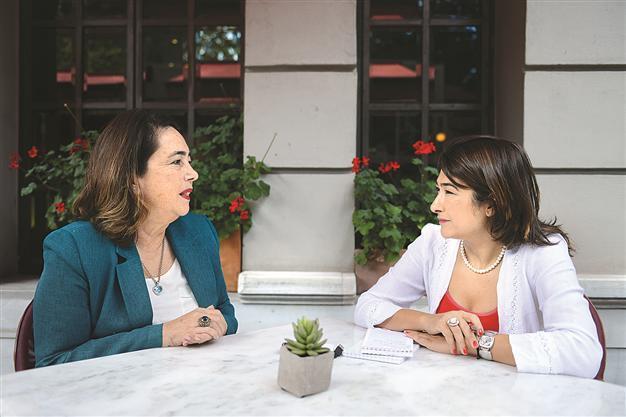W-20 under Turkish presidency to set roadmap for women’s inclusion
Barçın Yinanç - barcin.yinanc@hdn.com.tr
 The Turkish G-20 presidency surprised the international community by launching Women20, according to Gülden Türktan, a member of a women’s NGO that pushed the government for the establishment of an engagement group to deal solely with women’s issues.
The Turkish G-20 presidency surprised the international community by launching Women20, according to Gülden Türktan, a member of a women’s NGO that pushed the government for the establishment of an engagement group to deal solely with women’s issues.During the previous G-20 summit, leaders set a target to decrease the gap between men and women in the workforce by 25 percent by 2025. “It is now time to endorse a roadmap to reach that target,” said Türktan, the president of Women20. The W-20 summit that will take place next month will provide policy advice to G-20 leaders for increased women’s inclusion in the workforce.
Tell us how the W-20 came into being.
As KAGİDER [Women Entrepreneurs Association of Turkey], we were a member of the C-20 – civil20 – trying to voice our issues through the C-20 as well as through the B-20, which stands for business.
So we were there, but the collective voice was never there. So when we go to the B-20 meeting, you’ll have a majority of men but only a small number of women. The wording about women started to be included in the declarations. In the Los Cabos declaration, the wish for social and economic inclusion of women was included.
At the 2013 Saint Petersburg summit, G-20 leaders underlined the importance of the financial inclusion of women and education. There are illiterate women, or women without bank accounts, for instance. Even though she earns money, she has no power over spending that money, and that money is taken away from her. This stops her economic empowerment. Last year in Brisbane, Australia, further progress for women was registered when the G-20 summit said the gap between women and men should be decreased by 25 percent by the year 2025. This 25 by 25 means [empowerment for] 100 million women across G-20 countries. I see this as a big step since it sets a target and it points at the problem. There is a gap between men and women on economic inclusion, and now we have a numerical target.
After Brisbane we had to add substance to this target because you always have positive intentions included in the declarations but never a concrete roadmap. Now we have a chance for a concrete roadmap. … With the launch of the outreach group of W-20, we hope to have a roadmap for the economic inclusion of women in the workforce.
It is the first time that there will be a W-20 summit, and this is happening under the Turkish presidency.
Exactly, and it’s almost a miracle. And this is not an exaggeration. The Turkish presidency was very successful [in realizing this initiative]. And to name two people among others – which probably includes President Recep Tayyip Erdoğan, who I assume has given his blessing when he was prime minister at the time – is Ayşe Sinirlioğlu, Turkey’s G-20 sherpa and [then-Deputy Prime Minister] Ali Babacan. As KAGİDER, we conveyed to Ayşe Nur İslam [the family minister at the time] that the W-20 should be opened under the Turkish presidency. But it was a new concept; she listened very wholeheartedly and said she would give her support. We also talked to Minister Babacan who noted that we needed the consent of all G-20 countries. [This could have proven difficult] for not only political reasons but also budget reasons and the like. It is also more difficult to designate women’s NGOs to work for the W-20 [as it is unlike] the B-20, where you have chambers of commerce to do that work. But our government succeeded in convincing others.
And we need to thank Ayşe Sinirlioğlu and Ali Babacan for that as well as President Erdoğan for his blessing.
And why did you say it was almost like a miracle?
Some countries were of the view that Turkey would not be very inclined to make this happen. International observers thought Turkey had a rather macho government and did not think the Turkish government would give its consent to a W-20 initiative. We actually tried to convince our officials that the W-20 initiative would be a chance for Turkey, and in the end, the government succeeded in realizing this initiative and we are very proud. All international opinion leaders are applauding Turkey for that. We were established last April and in a very short time, we succeeded in securing the participation of the majority of the member countries.
Argentina, India, Indonesia, Saudi Arabia and South Africa are missing; why is that?
They have not yet answered us; it does not mean they will not come; we are expecting the missing countries to send their representatives.
Despite prejudices, the W-20 has been launched under the Turkish G-20 presidency. What does it tell us about Turkey and women’s issues?
It points to a great success for the government of Turkey. Everybody is applauding. You don’t know how many “thank you” and “bravo” messages we are getting. They are saying Turkey has done it.
How do you explain this contradiction? On the one hand, this government is criticized domestically and internationally for being conservative on gender equality issues, yet at the same time, it is under this government’s rule that the G-20 now has a women’s engagement group.
That’s one of the questions that I received from international interlocutors. “What did you do to convince them? This is unbelievable,” I was told. After the [AKP] government had a macho outlook; there was only one female minister in the [successive AKP] cabinets and some of the rhetoric [used by government officials] created negative effects. So the decision that was taken by the government was the opposite of the image Turkey had in the international arena. This decision has helped the international image of Turkey. A courageous sherpa, a very understanding deputy prime minister and a president who gave his blessings; that’s the image that we have given to the whole world. And the sherpa is a woman of course.
So perhaps the government has chosen to improve its image.
I’d rather say the government decided to do the right thing.
What will you try to accomplish in the first W-20 summit?
It is not only Turkey’s decision, so we will try to get the opinions of all other members, and we need to have a democratic result that suits every country. And there are developed countries, less-developed countries and more conservative countries, so we need to have something that will be signed by the leaderships of all the countries. But my inclination is to have a roadmap for 25 by 25. So our target is to put forward policy decisions for governments.
What is some of the policy advice that is on the agenda?
As the Turkish presidency, we have 11 priorities. Of these, one that is very close to my heart is childcare. When women take care of the children, the elderly or those with disabilities in the family, it is unlikely she will go to work. Women will enter the workforce more when we provide childcare. Social care [for the elderly and those with disabilities] is important as well.
Financial inclusion, supporting women-owned enterprises and innovation, increasing the number of women in both leadership positions in the public and private sectors, paying special attention to rural women in terms of agriculture and food policy are among the other 11 points.
Member countries have differing views on women issues, do you think it will be particularly difficult to agree on some policy decisions?
The problems are very common and we should work on that common ground. I believe we should not be too severe in our rhetoric, otherwise it will not be accepted by all countries. And I think that even if you have a very conservative attitude toward the inclusion of women in the workforce, you can still have a positive attitude for providing childcare. We can always find a common ground where every country can do something to increase women’s economic inclusion.
The majority of G-20 countries are developed countries with fairly advanced levels of gender equality; yet women’s issues have only recently made it onto the agenda of G-20 summits; why is that?
It is about taking the decision. When you decide on your own, it’s easy for men to choose men [to work with]. Let’s have an all-male board and we will decide in harmony. They are kind of scared. Inclusion is change and people are scared of change.
What is the essential message that should be passed onto G-20 leaders?
A study shows that Lehmann Brothers would not have collapsed if it had been Lehmann Brothers and Sisters. Women on the boards of corporations always warn against risks and against what is financially not feasible. Women are a value to institutions.
So would you say that they are a panacea to economic crises?
Exactly. They are a guarantee at having fewer economic crises.
Who is Gülden Türktan?

Gülden Türktan, the president of W20 Turkey, is currently a member of the Presidential Council of the Women Entrepreneurs Association of Turkey (KAGİDER). One of the founding members, Türktan served as the president of KAGİDER between 2011 and 2015.
During her presidency at KAGIDER, she initiated the program known as FEM – an equal opportunity program at corporate workplaces.
An entrepreneur, Türktan worked as an executive as well as a board member of the local operation of ABB, a Swiss-Swedish engineering conglomerate, from 1988-2008. She now serves as a board member for several institutions and delivers speeches about leadership and enhancing management skills, as well as women providing added value for the success of corporations.
She has studied economics and business and is a management school graduate from New York University and Boğaziçi University.
















